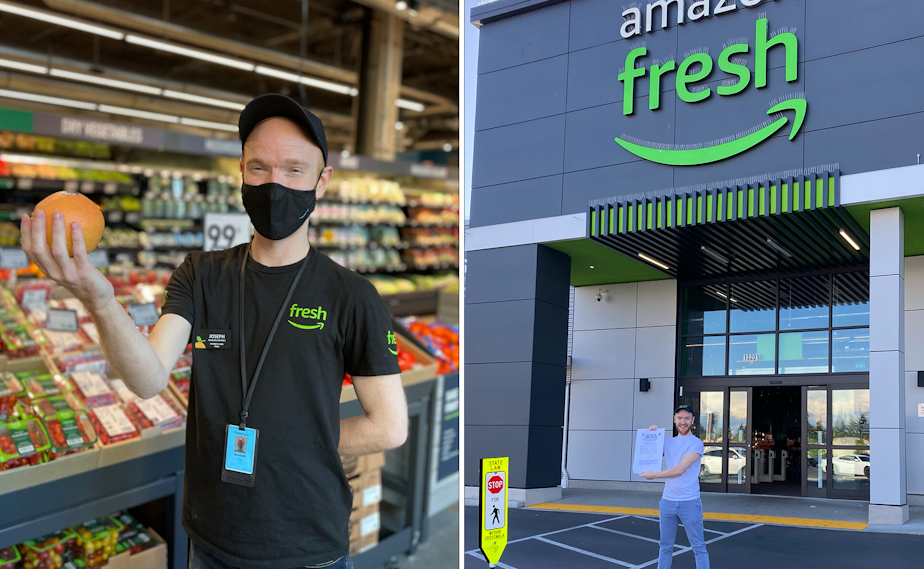Amazon settles with former employee over claims of union interference

Amazon settled a dispute with a former employee of an AmazonFresh grocery store this week over allegations of unfair labor practices at the Seattle facility.
The settlement agreement shared with KUOW requires Amazon to post notices of employees’ rights to unionize at the Amazon Fresh store and in online resources like Amazon’s “A to Z” app.
The complaint dates back to 2022, when Joseph Fink was working at the Amazon Fresh store in Seattle’s Central District. In the complaint with the National Labor Relations Board, Fink says workers were disciplined for posting union information and distributing union authorization cards in the break room.
Amazon declined to comment on the settlement.
“I am excited for all of the Amazonians, and all of the workers who will read the settlement, who will be reaffirmed in their power and in their rights in their workplace,” Fink said. “That is the legacy of this settlement.”
Fink and some of their coworkers began meeting to share grievances about their workplace under the name Amazon Workers United last year. They didn’t hold an election or partner with a more established organization, but the labor board says there’s nothing stopping employees from informally banding together and calling themselves a union.
Sponsored
Though Fink feels vindicated by the settlement with Amazon, they acknowledged some will see it as a “wallpaper cure,” since posting a notice isn’t much of a penalty for anti-union activity.
“I don't want any money from Amazon,” Fink said. “What I wanted is what I got, and that was a settlement where the company acknowledged that I had the legal right to do what I was doing, and reaffirmed that publicly.”
The National Labor Relations Board is limited in its enforcement authority. The agency isn’t legally authorized to fine companies that violate labor law. At most, the board can force companies to reinstate illegally fired workers and pay them back wages. Former NLRB Chair Wilma Liebman says the settlement is the best someone in Fink’s position can hope for.
“The remedies are weak,” she said. “And many employers over the years have made the calculation that the remedies are not stiff enough to dissuade them from trying to nip this union organizing in the bud, whether through lawful or illegal means.”
Liebman and other experts say the board's limited enforcement capability is one reason the labor movement has withered in recent decades. Union representation is at an all-time low at 10.1% of American workers, though there are some early indications that trend may be reversing. Petitions for new union elections spiked by 53% last year.
Sponsored
Amazon has lobbied aggressively against efforts to unionize various facilities across the country. There has only been one successful union election at an Amazon facility, a warehouse in New York. More than a year later, the Amazon Labor Union doesn’t appear any closer to getting a contract.
Another major obstacle is the high turnover rate among service workers. The infrastructure for forming a union was established when it was common for factory workers to spend 20 years in the same job. Today, workers are much more likely to move on before a union campaign can gain momentum.
The group at the Amazon Fresh store is a perfect example. No one who formed the Amazon Workers Union still works at the store. Fink has moved on to a different job. Nevertheless, they are celebrating this small victory.
“I hope that that will leave a legacy for other workers to do what I did, which was just to use my voice and speak up,” Fink said.
This story was updated on Friday, 6/16/2023 at 2:15 p.m.




